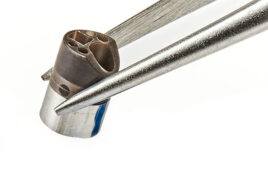Personalized wearable digital technology can help adults diagnosed with autism understand and manage their anxiety.
Reflecting back on incidents can help people manage their anxiety, though traditional reflection aids such as written diaries are often abandoned. However, wearable technology could provide the solution.
Human Computer Interaction specialists at Lancaster University have worked with adults diagnosed with autism to create prototype personalized wristband devices called Snap that enable wearers to digitally record data when they are feeling anxious.
In their paper “Anxiety and Autism: Towards Personalized Digital Health,” Lancaster researchers explain how Snap was created following a three-month rapid development process.
Snap enables wearers to record data by stretching the wristband, which is made from natural materials for rapid prototyping. Snap also includes a customizable 3-D printed pod containing the computing unit, which uses an Arduino-compatible RFDuino micro controller. This enables users to freely modify and assemble their own devices by tapping into the growing number of community maker movements and open-source software.
Off the shelf wearables, such as the Fitbit, are able to capture data such as gestures, steps, and heart rates, however these devices capture this information passively. Snap records data when the wearer intentionally interacts with it – so they have greater control of the information collection, an important consideration for people diagnosed with autism.
Researchers noticed that people diagnosed with autism have a tendency to play with things in their hands when they are anxious and wanted to digitize this activity. The idea for a wristband came up in the study’s workshops.
“We wanted to build our own device and we thought that if we could digitize something they do anyway – play with things in their hands – then that could potentially help them to manage their anxiety,” said Dr. Will Simm, one of the researchers from Lancaster University School of Computing and Communications. “This is about empowering people with data to reflect about their anxiety.”
It is important that Snap can be customizable for the user so they have a greater sense of ownership of the device than an off-the-shelf product.
Through rapid prototyping, the researchers were able to involve adults diagnosed with autism in the design process and it was discovered that the design process itself, and the ability to customize Snap, was therapeutic to the volunteers.
“Our approach has facilitated an understanding and management of anxiety through Snap interactions and data capture,” Dr. Simm said. “The process of designing and building Snap has enabled our participants to discuss experiences of anxiety in a way their supporters said they had never before articulated.”
Another important element of Snap, as expressed by the participants of the research, was that the captured data was retained on the device and could be downloaded onto a computer without reliance on cloud storage.
Previous research on people with autism has revealed the importance of being able to reflect on positive life experiences in addition to anxious moments.
“It was also crucial that the project didn’t just focus on the build up to anxious states and so the device can also record data on wearers’ positive states as well,” Dr. Simm said.
Snap also has an additional benefit of signaling to support workers during social settings when the wearer was getting anxious – enabling them to take action.
The researchers are now looking at further developing the prototypes by refining the design and including additional features requested by the autistic study participants, such as a clickable button. An online platform to aid reflection is also being developed that will work with customizable and off-the-shelf wearable devices.




